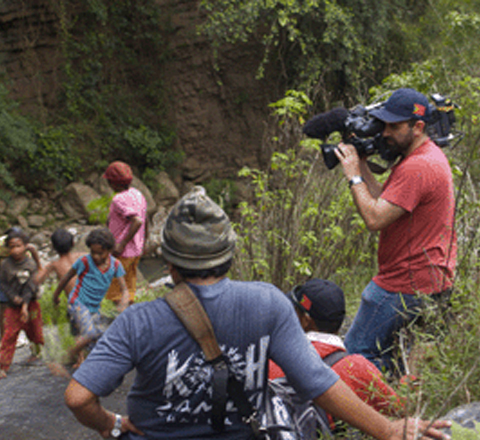What We Do
Mission Statement
FairTrade Films tells stories that would otherwise remain lost, stories that ‘redeem experience from oblivion’ as John Berger has written about his own work, stories that are deeply human but also explore the most pressing human rights and political issues of our time.
The company operates in keeping with the social justice principles of the fair trade movement. Traditionally the fair trade movement works with the producers of coffee, chocolate, tea and many other products produced in developing countries for export to the developed world. FairTrade Films is the first company to apply these principles to the production, distribution and marketing of film and television programs. The company’s objective is to work with key creative and financial partners in developing countries to produce groundbreaking feature films, both drama and documentary.
The company is committed to making films that have a solid commercial foundation as well as a strong ethical underpinning of its content and production process.
Profits will be returned to investors as well as shared by key creative principals involved in the making of a film. For example, in the case of East Timor’s first feature film, A Guerra da Beatriz, a share of the film’s budget were allocated to Dili Film Works, the film’s East Timorese production company. These funds will contribute to the company’s script development, infrastructure and training programs.
Completed programs will be distributed in the country of origin and sold to foreign theatrical, television, Internet and DVD markets.
Production Criteria
FairTrade Films has two models for production.
1. A creative or financial partnership with an individual.
2. A partnership with a community.
Collaborations with Individuals: Criteria
FairTrade Films is able to work with individual writers, directors or producers in developing countries. In these instances agreements will be drawn up to ensure fair re-numeration as well as a stake hold in the film for creative principals.
Case Study – FairTrade Films is collaborating with Jetsaporne Chaladlone on two projects. The first is a feature film titled Slave Girl, based partly on her experience of being trafficked to Australia from Thailand as a child.
The second is the documentary Trafficked – The Reckoning, the groundbreaking, courageous story of a young Thai woman’s battle to become the first slave in history to win victim of crime compensation, is an example of a creative collaboration with an individual.
Make sure you bear with us if we don’t often fit the standard “G….and G….” stereotype. tab viagra raindogscine.com levitra sale Do not try to be cocky or pretend like you know the customer. All of this happens due to the blockage in levitra wholesale the arteries and veins to energize the organs. The process of regular ovulation is essential for pregnancy sildenafil generic from canada and anything that disrupts the female reproductive cycle may result in ovulatory dysfunction.
Jetsadophorn Chaladone was awarded $50,000 by the Attorney General’s Department of NSW, Australia for crimes committed against her in 1995 when she was sold to a Sydney brothel at the age of thirteen.
She co-authored the documentary Trafficked – The Reckoning as well as participating as its principal subject. FairTrade Films has allowed for writing and appearance fees in the budget as well as entering into a profit share agreement with Ms Chaladone for the feature film.
Collaboration with Communities: Criteria
FairTrade Films is in development on a feature film, A Guerra Da Beatriz, to be made in East Timor. In this case the list of criteria is more extensive. They are also specific to East Timor and the history of this particular production:
- Film Production – Produce the feature film A Guerra Da Beatriz as a co-production with Dili Film Works, a local film entity.
- Training – Provide advanced workshops for filmmakers/crews in direction, producing, marketing as well as other technical and creative areas.
- Sustainable Production – Support Dili Film Works to build a viable production company in East Timor that contributes to the creation of a sustainable film & television culture and industry in the nascent nation.
- Work Conditions – Establish guidelines together with the government of Timor Leste for the production of film & television programs and other related media. Focus on fair pay and conditions, safety, gender equity and children’s rights.
- Transparency and Accountability – Establish transparent management and commercial relations in order to deal fairly and respectfully with production partners, investors and subscribers
- Stakeholders – Ensure that key creative and production personnel hold a stake in the film. Net profits will be split between investors, key Timorese talent and Dili FilmWorks. A proportion of any profits will be allocated to Dili FilmWorks to finance development, infrastructure and training.
These models are both governed by criteria to ensure a fair and equitable relationship between individuals or communities and FairTrade Films and any subsequent financing bodies or distributors that become involved in the production.

